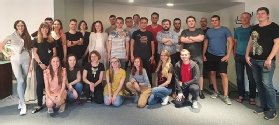[ad_1]
Ukrainian businesses are continuing to operate amid Russia’s invasion of their country and are determined to carry on as part of the national effort not to be overcome by the threat from the east.
Software development service provider Redwerk is an example. After the lives of all its staff were thrown into the air when Russian tanks entered Ukraine, the company had to act quickly.
Konstantin Klyagin, its founder, was travelling home after a holiday in Sri Lanka and, during a change of flight in Dubai, he learnt that Russia had invaded his homeland.
He had to change his plans while at Dubai and headed to Berlin, where he had previously lived and owned a flat. He has not yet been back to Ukraine.
Klyagin is the founder and CEO of Ukrainian software development company Redwerk, which focuses on developing software as a service (SaaS) for enterprises. It was set up by a 24-year-old Klyagin in 2005 and now serves international customers with SaaS development services built in the Amazon Web Services and Microsoft Azure clouds.
The company started off in Zaporizhzhia and opened an office in Kyiv in 2010. Its workforce comprises developers, DevOps experts, project managers, user interface (UI) designers and every role that is required to create and launch a full-scale SaaS operation, said Klyagin.
It was on 24 February this year when, on a flight home to Ukraine, Klyagin had to think about helping his family and staff get to safety, before thinking about his business.
“When I arrived in Dubai to change flight, the media was full of news about the invasion,” he told Computer Weekly. “I listened to Vladimir Putin’s speech and realised I wasn’t going to Ukraine.”

“I listened to Vladimir Putin’s speech and realised I wasn’t going to Ukraine”
Klyagin said the most shocking sight for him was Russian tanks crossing the border just 80km from the city of Kharkiv, where he grew up and had family.
“I never made it back to Kyiv in February and I have been working remotely ever since,” he said. “I arrived in Dubai, realised Russia had invaded and there was no way back as the air space was closed.”
Klyagin had previously lived and worked in Germany and had a flat in Berlin, so he decided to go there. His girlfriend, who was pregnant with their first child, soon joined him.
After five months in Berlin, they moved to Lisbon in Portugal, where Klyagin had a large group of friends. “Lisbon was considered an important web 3.0 hub and many Ukrainian entrepreneurs came here,” he said.
His parents are now safe in Berlin, but his business, with 80 employees, has remained in Ukraine.
Klyagin himself plans to return to Ukraine as soon as it is possible. “When it is safe and the war is over, I am moving back to Ukraine the next day,” he said.

In the meantime, Redwerk has continued to operate at full scale, after a temporary slowdown when the company and its staff readjusted to the new reality facing Ukraine.
“At the beginning of the invasion, there was a lot of uncertainty,” said Klyagin. “Many companies were moving entire operations to the west of the country but there were major difficulties, including a shortage of housing, so we decide to do it in a decentralised way.”
This is where the firm’s remote working experience gained during the Covid-19 pandemic helped. “We told everyone that each of them would get $2,000 up front in cash or in any form they wanted, so to pay their way to safety, or they could use their own money and we would compensate them,” said Klyagin.
Pretty much all of the Redwerk staff took up the offer. “Most of the team has been working remotely since the pandemic with only 10 to 15 in the office every day,” said Klyagin. “Our people either went to the west of the country, or to the centre.”
Then, on 28 February, Klyagin wrote an email to his employees asking if everyone was safe and asking what they needed to work. “I said let’s continue working because it was important for everyone to have income in that situation and was also important for Ukraine’s economy,” he said.
Klyagin said that in the first week of the invasion, 20% of the company’s staff could work, by week two it had reached 80%, and before the end of March it was 100% operational. “And we kept hiring people,” he added. “We did not let anyone go, apart from the usual attrition.
“We are gaining people because there were more good people on the market who were just victims of their employers panicking and letting them go. We were able to cherry-pick the best minds and talent to grow the company.”
The company lost two employees when they joined the Ukrainian military.
According to Klyagin, Redwerk is doing more business now than before the war. He believes this is because he has concentrated on the business to stop him thinking about the turmoil in Ukraine. “I found this a shelter in the war and it worked because I got five new clients, 25 more staff and the business grew,” he said.
The company lost no customers after the invasion after Klyagin contacted each of them separately to reassure them that work would not be interrupted.
In fact, Redwerk is not Klyagin’s only business. Since 2021, he has also invested in a company set up in Zaporizhzhia that develops drones for civilian use, focusing on industrial settings. IZIVIZ, as the company is known, is still in its startup phase, but has undergone a transformation during the war.
“The business went on hold for a couple of months, but we decided to help the army prepare their drones and have provided drones free of charge,” he said.
Source link



